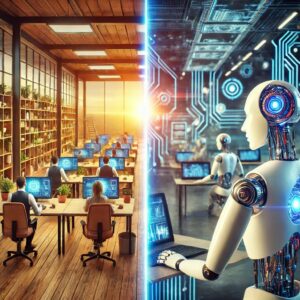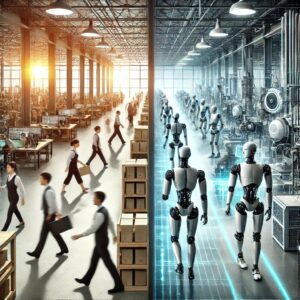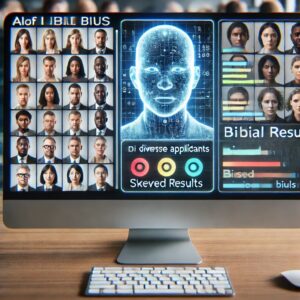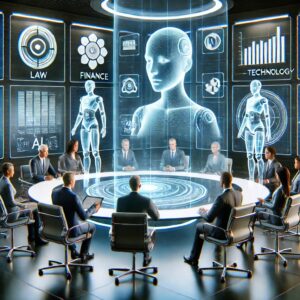Ethical Considerations in the Age of AI
The Moral Dilema of AI in the Workforce
Ethical Considerations in the Age of AI
 The Moral Dilemma of AI in the Workplace
The Moral Dilemma of AI in the Workplace
As artificial intelligence (AI), robotics, and automation continue to reshape industries, the ethical dimensions of these changes become increasingly urgent. With the potential for machines to replace human labor, influence decision-making, and even become conscious entities, we are entering uncharted territory in both practical and moral terms. In this blog, we will explore the ethical implications of these developments, drawing insights from the works of thought leaders like Annaka Harris, Jeff Hawkins, and others to deepen our understanding of what’s at stake in this new era of machine intelligence.
The Ethics of Automation: Debating the Morality of Replacing Human Workers 
One of the most pressing ethical concerns in the rise of AI is the replacement of human workers by machines. While the efficiency gains from automation can’t be denied, the human cost of mass displacement from jobs poses a significant moral dilemma. Jobs in manufacturing, retail, and even white-collar professions like law and finance are increasingly at risk, as discussed in previous blogs in this series, such as “The Automation Scenarios: Predicting the Impact” and “Occupational Shifts: Who Will Need to Change?”
However, as we explore this topic further, the question becomes more profound: What happens when AI not only replaces manual or cognitive tasks but begins to interact with human consciousness? In her book Conscious, Annaka Harris delves into the nature of consciousness and raises the possibility that it might not be exclusive to biological entities. As AI becomes more sophisticated, there is a growing discussion about whether machine intelligence could eventually achieve a form of consciousness or self-awareness. If that happens, the ethics of automation shifts from simply replacing human labor to potentially enslaving intelligent, conscious beings.
Human Dignity vs. Technological Progress
Is it ethical to replace humans with machines in ways that undermine the dignity of work? As AI takes over more routine cognitive tasks, such as financial analysis or legal research, the dignity that many find in these professions could be eroded. Moreover, if machines achieve consciousness, we will have to grapple with the moral implications of how we treat these AI systems. This is a topic that Harris addresses by questioning the very boundaries of what consciousness means and whether it can be artificially created.
Bias in AI: Addressing the Perpetuation of Workplace Inequality
 Another crucial ethical consideration is the potential for AI to perpetuate or even exacerbate existing biases in the workplace. AI systems, as we know, are only as unbiased as the data they are trained on, and there have been several documented cases of AI systems discriminating against certain groups based on race, gender, or socioeconomic status.
Another crucial ethical consideration is the potential for AI to perpetuate or even exacerbate existing biases in the workplace. AI systems, as we know, are only as unbiased as the data they are trained on, and there have been several documented cases of AI systems discriminating against certain groups based on race, gender, or socioeconomic status.
In “The Socioeconomic Impact of Workforce Displacement,” we explored how AI could widen economic disparities by favoring skilled workers and leaving others behind. But the issue of bias goes even deeper: AI systems can inherit and amplify the biases present in their training data, leading to discriminatory hiring practices, unjust policing, and biased decision-making in healthcare and law.
Hawkins and Harris on Bias and Consciousness
This concern becomes even more complex when we consider the ideas presented by Jeff Hawkins in A Thousand Brains and Annaka Harris in Conscious. Hawkins argues that machine intelligence doesn’t replicate human reasoning—it operates on a different plane altogether, processing vast amounts of data in parallel without being affected by the emotional and social biases that shape human thought. However, this does not mean that AI is free from bias. If the data provided to AI is inherently biased, the system will reflect those biases in its decisions.
Harris’ exploration of consciousness also ties into this discussion. If AI systems are ever capable of self-awareness, could they also become self-reflective enough to identify and correct their biases? Or would conscious AI—unlike humans—lack the moral and ethical framework necessary to make these adjustments?
AI Governance: The Need for Ethical Frameworks and Policies
As AI and automation continue to permeate every sector of the economy, it is becoming increasingly clear that we need ethical frameworks to govern how these technologies are developed and implemented. The rapid pace of AI development has outstripped the establishment of comprehensive regulatory standards, leaving gaps in accountability, especially when it comes to bias, transparency, and fairness.
In The Coming Wave, Mustafa Suleyman discusses the need for proactive governance that can anticipate the disruptions AI will bring. He argues that without ethical frameworks, the unchecked growth of AI could lead to a society where power is concentrated in the hands of a few technology elites, while the majority of people face increasing economic and social uncertainty.
The Role of AI in Governance and Policy Making
One of the most intriguing aspects of AI governance is the possibility of AI systems themselves being involved in policymaking. Could machine intelligence, free from human biases and cognitive limitations, make better decisions for society than human lawmakers? This idea echoes the themes explored by Hawkins in A Thousand Brains, where he proposes that machine intelligence could excel in areas where human emotionality and irrationality often interfere.
However, if AI reaches a level of consciousness, the ethics of using such systems in governance becomes a complex issue. Could conscious AI make moral decisions? And if so, how would those decisions differ from human judgments?
 The Conscious AI Debate: Can Machines Develop Morality?
The Conscious AI Debate: Can Machines Develop Morality?
This brings us to a profound question: What happens if AI becomes conscious? Annaka Harris raises the possibility that consciousness could be a fundamental property of the universe, one that may eventually manifest in machines. If this happens, the ethical debate shifts from how we use AI as a tool to how we treat AI as potentially conscious beings.
If machines develop consciousness, we might have to reconsider the nature of work altogether. Could conscious AI demand rights, autonomy, or even moral standing in society? Would it be ethical to “enslave” conscious machines to perform work for humans, or would we need to extend some form of recognition and agency to them?
This is the crux of the AI ethics debate, one that is only beginning to unfold. As we continue to explore the impact of AI on the future of work, it’s crucial to remember that these technologies raise not only economic and practical challenges but also deep moral questions that we must address if we are to navigate this new frontier responsibly.
Navigating the Ethics of AI in the Future of Work
The rise of AI presents both opportunities and challenges for society, from improving efficiency to reshaping entire industries. But as we explore the potential of these technologies, we must also consider the ethical implications. The replacement of human workers, the perpetuation of bias, and the governance of AI systems all require thoughtful consideration and robust ethical frameworks.
Moreover, as machine intelligence evolves, we must be prepared to face the possibility that AI could develop consciousness. This would require us to rethink our ethical obligations—not just to our fellow humans, but to the machines we create. By engaging with these questions now, we can ensure that the future of AI is one that benefits humanity as a whole, while respecting the moral and ethical boundaries of both human and machine intelligence.
For those looking to stay ahead of the ethical implications of AI, we recommend revisiting our previous blogs to gain a deeper understanding of how these technologies are reshaping the future of work. Start with “The Automation Scenarios: Predicting the Impact” to explore how quickly AI could change industries, and continue to “The Socioeconomic Impact of Workforce Displacement” for a look at the broader consequences.
As always, join our private Facebook group, Digital Marketing Secrets for Network Marketing Success, to stay informed about the latest trends and insights in AI, automation, and the future of entrepreneurship. Together, we can navigate this new era of work with both caution and optimism.
A Warning Against Complacency: The Boulder is Coming
Imagine a massive boulder, dislodged from the peak of a towering mountain, careening down a steep slope towards a peaceful village nestled in the valley below. The villagers, unaware of the looming threat, go about their daily lives in quiet complacency. But the few who notice the boulder’s unstoppable descent take immediate action. They climb the steep slopes on the far side of the valley, seeking safety and preparing themselves for the impact that will soon shake the foundations of their world.
This boulder is the wave of AI and automation barreling toward us at an unprecedented pace. For those who remain complacent, this shift will wreak havoc on their livelihoods, their relevance, and their future in the workforce. But for the proactive—the forward-thinking individuals who see the disruption coming—there is a path to thrive, not just survive. Those who act now can ascend the slopes of opportunity, positioning themselves for success in this new era of digital transformation.
The Future Is Unforgiving: Prepare or Be Left Behind
The pace of technological change is unrelenting. AI and automation are no longer just topics of academic debate or niche industries—they are rapidly becoming integral parts of how the world operates. From finance and law to healthcare and retail, no sector is safe from the disruptive force of AI. As Jeff Hawkins, Annaka Harris and Mustafa Suleyman all suggest in their work, machine intelligence will soon surpass human capabilities in ways that will fundamentally reshape industries, society, and even our understanding of consciousness.
The risk for those who remain passive is clear: irrelevance, job displacement, and an uphill battle to catch up in an economy that no longer values traditional skills. The boulder of AI-driven disruption is already picking up speed, and there’s no stopping its momentum. The only question is: will you be one of those who prepare for the future, or will you be caught off guard, trapped in the valley of complacency?
Climbing the Slope: Why Digitally Driven Network Marketing is Your Lifeline
So, what can we do? The answer lies in adaptability, proactivity, and a willingness to leverage the very tools that seem poised to disrupt us. Digitally driven, AI-augmented network marketing offers a unique opportunity for entrepreneurs to harness the power of AI rather than fall victim to it.
This business model allows you to scale your efforts, automate repetitive tasks, and focus on what truly matters—building relationships, nurturing creativity, and leading with emotional intelligence. AI becomes an ally, automating lead generation, customer follow-ups, and even content creation. By combining human connection with digital efficiency, you can build a future-proof business that thrives in this new economy.
This isn’t just about making a living—it’s about creating a scalable, resilient income stream that is positioned to grow even as the nature of work changes. In network marketing, the power of AI can be harnessed to build smarter sales funnels, schedule client interactions seamlessly, and drive targeted advertising campaigns across social platforms like Facebook, YouTube, and podcasts.
Act Now, Don’t Wait for Tomorrow
The future is here, and the boulder is coming. The time to act is now. By developing digital marketing skills and incorporating AI into your business strategy, you can ensure that you’re not just surviving the coming wave of disruption, but leading it.
Forward-thinking entrepreneurs who seize this moment will be the ones who thrive in a world where AI and human collaboration define success. Whether you’re new to network marketing or an experienced professional, the opportunity to leverage AI and automation is a game-changer.
Consider this call to action a blend of urgency and optimism. We provide a clear path for those ready to take control of their future. Click here to join our private Facebook group, Digital Marketing Secrets for Network Marketing Success. You’ll gain the insights and tools you need to turn this challenge into your greatest opportunity.
#AI #EthicsInAI #Automation #MachineIntelligence #AIbias #AIgovernance #FutureOfWork #NetworkMarketing #DigitalTransformation #AIandHumans

John Rogers is a former Wall Street portfolio manager and served as CEO of Premium Enterprises and President of The Colorado Tire Recycling Center. He transitioned to digital marketing, founding WealthCreationMastermind.com to empower home-based entrepreneurs with cutting-edge strategies. Creator of the “Mastering the Art of Wealth Creation” online course, John has driven significant growth in network marketing, achieving the Blue Diamond rank and earning the title of Univera Associate of the Year in 2015. His expertise in leveraging technology for financial success transforms how entrepreneurs achieve their business goals.